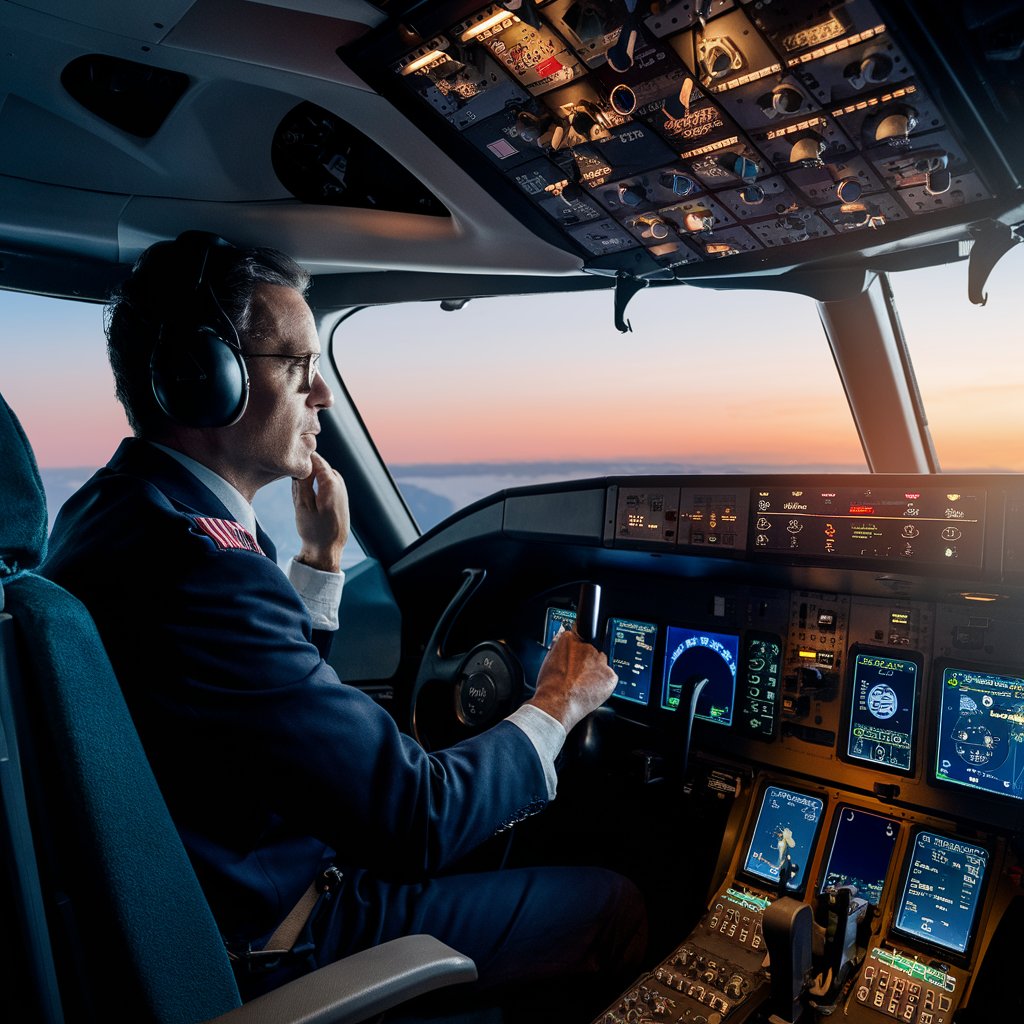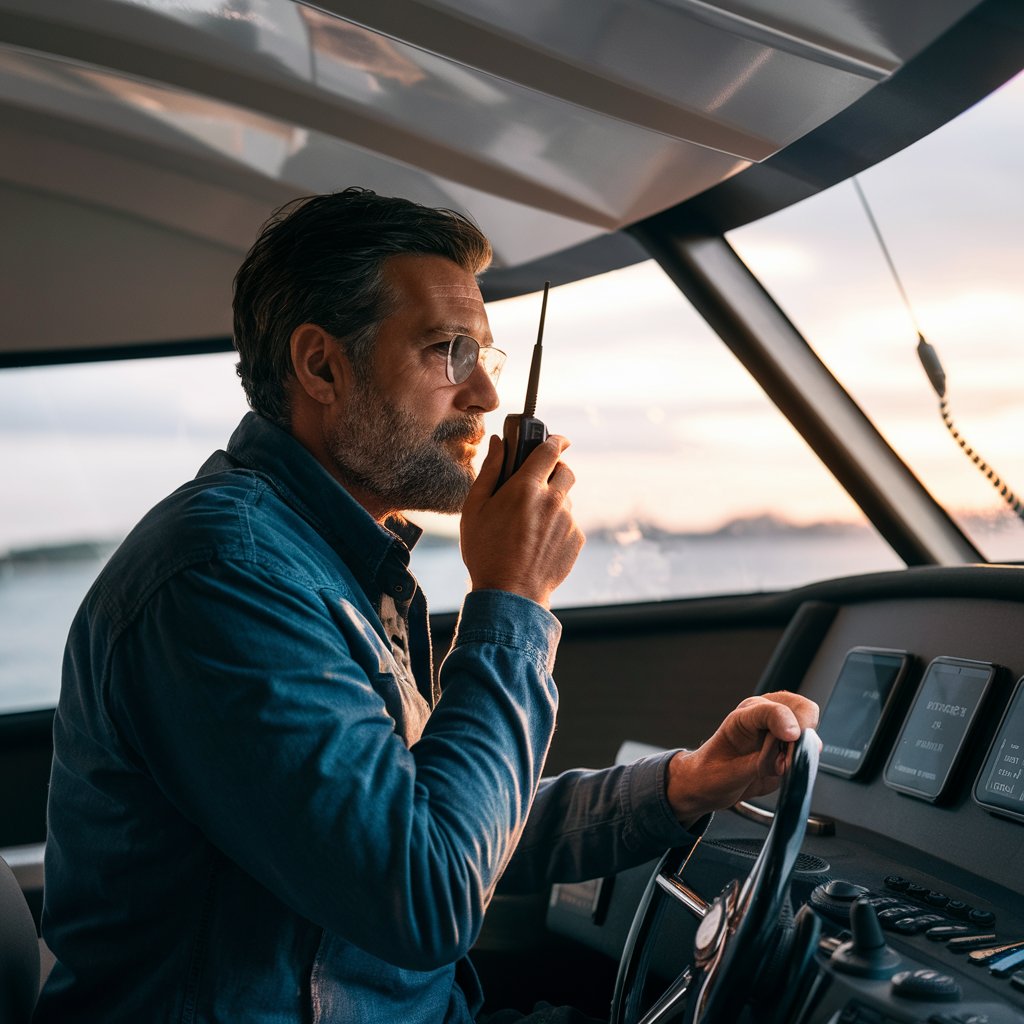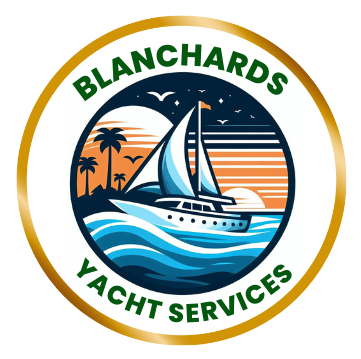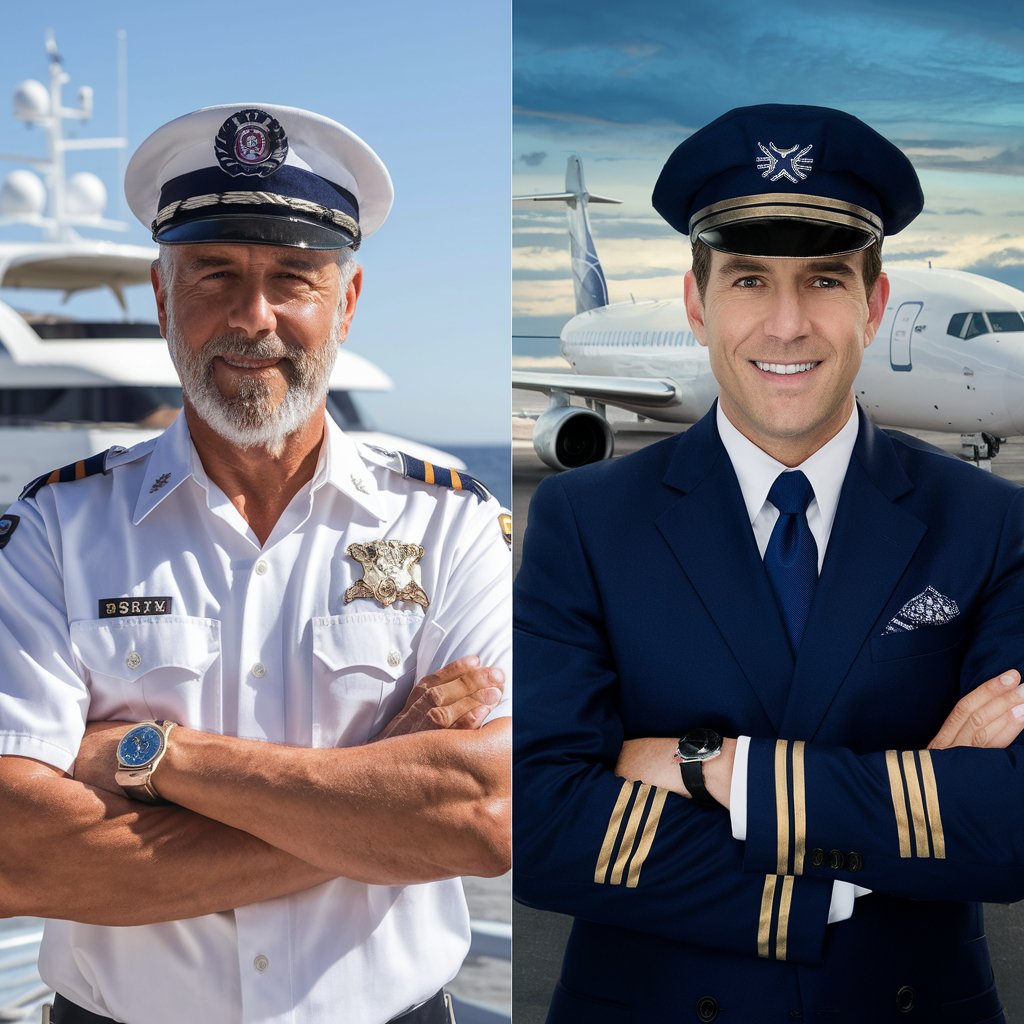I often marvel at the unique responsibilities that captains of both yachts and airplanes shoulder. For yacht captains, the tranquil environment of the open seas presents a captivating backdrop. Here, the skills needed include a robust understanding of the sea’s mood: reading the tides and working with rather than against the currents where the ever-shifting weather is both a challenge and a compass that guides the voyage.
Airplane captains, by contrast inhabit a different realm. Their world is the vast expanse above us, where the rules of navigation are set amidst clouds and controlled airspace. The three-dimensional nature of their journey requires a keen sense of vertical as well as horizontal space, and they monitor a complex system of communication with air traffic control to keep their passengers safe.
Comparing environments, I find that Yacht Captains foster a close bond with nature. They navigate narrow channels, and must be dexterous in their maneuvering, ensuring comfort while catering to their guests’ experience at sea. On the other hand, airplane Captains/Pilots command their craft in an environment not visible to the naked eye. They interpret data, communicate with ground stations, and make calculated decisions based on instruments.
A yacht captain embodies the essence of leisure, navigating the azure waters with a sense of freedom and adventure. Their domain is one of luxury and relaxation that evokes a sense of tranquility and escape. Yacht captains cater to the desires of their passengers, ensuring every moment aboard is filled with enjoyment and indulgence. In contrast, an airplane captain commands a service that is often compulsory, bound by schedules and obligations where efficiency and precision are paramount. While they may marvel at the beauty of the clouds and distant landscapes, their primary focus is on delivering Passengers Safely and Punctually to their Destinations, adhering to strict regulations and procedures.
Simply put, while both captains command their respective vessels with skill and professionalism, the yacht captain embodies the allure of leisure and pleasure, while the airplane captain navigates the skies with a sense of duty and service.
Of course, there are also many captains of Private Jets that revel in the freedom and enjoyment of unparalleled luxury as they command sleek aircraft, indulging in the boundless vistas and exclusive amenities afforded by private aviation.

One aspect that’s common to both roles is the unwavering attention given to Weather Conditions. Captains in both domains diligently scan the horizon for Weather Patterns, changing course when necessary. Attentive yacht captains who closely monitor the weather gain the advantage of navigating safely and efficiently, ensuring smooth voyages for their passengers and crew.

When it comes to airplane captains, they adeptly modify altitude and speed to ensure a comfortable journey through turbulent air currents or unexpected meteorological occurrences. This skill not only enhances passenger comfort but also prioritizes safety throughout the flight.
With regard to communication: A yacht captain often uses maritime VHF to maintain contact with ports and other vessels, while an airplane captain is in unceasing contact with air traffic control. Despite these differences, both share the utmost priority: the safety of all under their care. This bridge of responsibility defines not just their roles, but also their identities as guardians of travel.


Contrasting Roles: Understanding the Variances, Skills and Certifications
Operational Environment:
- Airplane Pilot:
- Operates in a three-dimensional airspace, navigating through varying altitudes and airspace classes.
- Deals with complex air traffic control systems, adhering to strict regulations and communication protocols.
- Must contend with rapid changes in weather conditions, including turbulence, icing, and wind shear.
- Yacht Captain:
- Navigates across two-dimensional surfaces of oceans, seas, and rivers, with considerations of depth, currents, and marine traffic.
- Faces challenges such as tidal influences, coastal geography, and navigation hazards like reefs or shallows.
- Requires a deep understanding of maritime laws, navigation charts, and local regulations governing waterborne traffic.
2. Vessel Dynamics and Controls:
- Airplane Pilot:
- Commands highly complex aircraft with advanced avionics and flight management systems.
- Utilizes controls such as yokes, throttles, and rudder pedals to manage pitch, roll, and yaw.
- Relies on autopilot systems for routine flight tasks but must be prepared to manually override and handle emergencies.
- Yacht Captain:
- Operates a diverse range of vessels, including sailboats, Motor Yachts, and Catamarans, each with distinct handling characteristics.
- Uses steering wheels, engine controls, and sail trim systems to control direction, speed, and stability.
- Requires hands-on maneuvering skills for docking, anchoring, and navigating tight quarters in ports or marinas.
3. Crew Dynamics and Management:
- Airplane Pilot:
- Works within a structured cockpit crew hierarchy, coordinating with co-pilots, flight engineers, and air traffic controllers.
- Emphasizes crew resource management (CRM) principles to optimize communication, decision-making, and workload distribution.
- Bears ultimate responsibility for the safety of passengers and crew, maintaining authority over all flight operations.
- Yacht Captain:
- Oversees a more intimate crew dynamic, often comprising a small team of deckhands, stewards, and engineers.
- Fosters a collaborative atmosphere onboard, delegating tasks, and responsibilities while promoting teamwork and morale.
- Acts as a leader and mentor, providing guidance and instruction to crew members and fostering a culture of safety and professionalism.
4. Training and Certification:
- Airplane Pilot:
- Undergoes extensive training through commercial aviation programs or military service, encompassing theoretical knowledge, flight simulator sessions, and in-flight instruction.
- Earns commercial pilot licenses and type ratings for specific aircraft categories, requiring recurrent training and proficiency checks.
- Continuously updates skills and knowledge through recurrent training programs, regulatory compliance courses, and industry seminars.
- Yacht Captain:
- Attains certification through maritime academies, sailing schools, or apprenticeship programs, culminating in licenses and endorsements based on experience and proficiency.
- Gains practical experience through sea time, honing navigation, seamanship, and vessel handling skills under the guidance of experienced mentors.
- Pursues ongoing education and professional development to stay abreast of evolving regulations, safety protocols, and technological advancements in the maritime industry.
In summary, the distinctions between an airplane pilot and the captain of a yacht encompass a myriad of factors, including the operational environment, vessel dynamics, crew dynamics, and training requirements. Each role demands a unique blend of technical expertise, decision-making prowess, and leadership skills, tailored to the complexities of aviation or maritime navigation.
Mastery of Vessel Command: What are the Benefits
Yacht Captains:
Choosing a career as a Yacht Captain offers a unique blend of adventure, responsibility, and personal fulfillment. Beyond the allure of cruising through breathtaking waters and Exploring Exotic Destinations, becoming a yacht captain opens the door to a lifestyle defined by freedom and flexibility. As the leader of the vessel, you’ll have the opportunity to hone your leadership skills while overseeing a dedicated crew and ensuring the safety and satisfaction of passengers.
The luxurious amenities and accommodations onboard add an extra layer of comfort to your journeys, while the cultural immersion experienced while traveling to diverse ports of call enriches both your professional and personal life. With each voyage presenting new challenges and opportunities for growth, pursuing a career as a yacht captain promises a rewarding journey filled with unforgettable experiences and endless possibilities.
Benefits of pursuing a Career as a Yacht Captain

- Freedom and Flexibility: Yacht captains often enjoy the freedom of navigating open waters, exploring exotic destinations, and adapting their routes based on weather conditions and passenger preferences.
- Luxurious Lifestyle: Depending on the type of yacht and clientele, yacht captains may have access to luxurious amenities and accommodations while traveling to glamorous destinations.
- Leadership Opportunities: As the head of the vessel, yacht captains lead a team of crew members, fostering a sense of camaraderie and teamwork while ensuring safety and efficiency.
- Cultural Exposure: Yacht captains have the opportunity to interact with diverse cultures and communities around the world, enriching their personal and professional experiences.
- Adventure and Excitement: Every voyage presents new challenges and adventures, from navigating through challenging waters to organizing memorable experiences for passengers.
Airplane Captains:
Becoming an airplane captain offers a unique pathway to a fulfilling and rewarding career. Beyond the thrill of soaring through the skies, this profession embodies a blend of technical expertise, leadership acumen, and global exploration. Choosing to pursue a career as an airplane captain promises a journey filled with unparalleled experiences and opportunities for personal and professional growth.
The role not only grants access to the world’s most captivating destinations but also instills a profound sense of responsibility for the safety and well-being of passengers and crew. With the aviation industry witnessing steady growth, aspiring captains can anticipate stable career prospects and competitive salaries.
Moreover, the continuous training and certification requirements ensure that captains remain at the forefront of industry standards, fostering a culture of lifelong learning and development. In essence, embarking on the path to becoming an airplane captain opens doors to a dynamic and enriching career, where every flight serves as a testament to one’s passion for aviation and dedication to excellence.
Benefits of pursuing a Career as an Airplane Captain

- Global Travel: Airplane captains have the privilege of traveling to various destinations worldwide, experiencing different cultures, cuisines, and landscapes.
- Technical Mastery: Mastering the complexities of aircraft systems and navigation techniques showcases the skill and expertise of airplane captains, fostering a sense of pride and accomplishment.
- Safety and Responsibility: Airplane captains are entrusted with the safety and well-being of hundreds of passengers and crew members, emphasizing their leadership and decision-making abilities.
- Career Stability: With the growing demand for air travel, experienced airplane captains often enjoy stable and lucrative career opportunities with reputable airlines.
- Professional Development: Continuous training and certification requirements ensure that airplane captains stay updated with the latest industry standards and advancements, contributing to their professional growth and development.
Both yacht captains and airplane captains play vital roles in providing safe and enjoyable travel experiences.
Such leaders’ traits are universal: a calm demeanor, decisive action, and an unwavering commitment to safety and excellence. No matter their vessel, yacht or commercial aircraft, captains hold within them a compass of expertise, leading their crew and passengers not just across the horizon but towards a haven of reliability and trust.
**Our Website contains affiliate links. This means if you click and make a purchase, we may receive a small commission. Don’t worry, there is no extra cost to you. It’s a simple way you can support our mission to bring you quality content**.


This was a really eye-opening comparison of the distinct roles and responsibilities of yacht captains versus airplane captains. I found it fascinating to learn about the unique skill sets, operational differences, and career benefits of each profession. Your detailed breakdown highlighting the contrasts in terms of skills and certifications required was incredibly informative. It’s interesting to consider the advantages and drawbacks of working on the open water versus in the sky. This was a wonderfully insightful read, thank you for sharing.
Thank You Elias
I am happy you enjoyed the article
This is a really unique, interesting, and thoughtful post.
The airplane captain and the yacht captain operate in vastly different worlds. Worlds so different that neither captain will want their vessels to spend time in the other one’s space. The typical airplane pilot wouldn’t want his plane near water where it is not designed to function (except it is a sea plane), and the yacht captain wouldn’t want his vessel constantly tossed in the air by unfriendly waves and seas. Yet, there are interesting similarities in their roles as custodians of the passengers, crew and vessels they are responsible for.
I like how you detail the careers benefits of both yacht captains and airplane captains. An individual trying make a career choice between life at sea and life in the air would have a difficult time making a decision after reading this post except they already have a natural inclination towards one or the other.
Thank you, Troy. I really enjoyed reading this article.
Hi Oluseyi
I love your take on the articles, and thanks for your feedback. I am happy you enjoyed it
This is an excellent article.
I find it fascinating how captains of yachts and airplanes have such unique yet equally demanding responsibilities.
Both roles require a deep understanding of their environments and excellent leadership skills. While yacht captains emphasise comfort and pleasure, airplane captains focus on safety and punctuality. Despite their different realms, both captains prioritise the safety and well-being of those on board, showcasing their dedication and expertise.
Hey Husseein
Many thanks. i am happy you enjoyed the article.